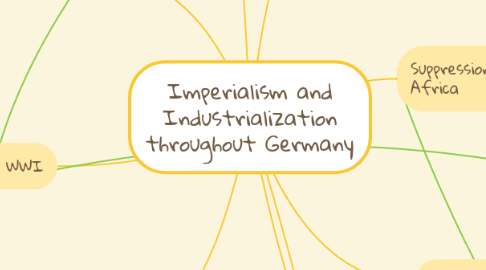
1. Otto Von Bismarck
1.1. AS a chancellor, Otto Von Bismarck put up policies that helped factories and business flourish as he promoted industrialization.
1.1.1. Otto Von Bismarck first ruled Prussia, then all of Germany. With the help from the independent South German States in the Confederation's defeat of France. He then formed the German Empire.
2. Tensions with France and Britain before WWI
2.1. Germany, France and Britain were interested in Africa's prized resources and minerals. As Germany began industrializing, A factory owner, named Friedrich Krupp, needed more resources. Germany began colonizing South Africa to claim land for themselves. They need raw materials in order for workers to keep their jobs and continue to work in factories.
2.1.1. This allows the industry to grow because when factories make more goods, the price falls, people buy more products, demand goes up, and they expand.
2.1.2. Nations in Europe tried to colonize Africa to mine for rich minerals and resources. This is an event that played a part in the scramble for Africa.
3. Imperialism during WWI
3.1. During World War I Germany fought against the allies. As a result of Germany's healthy economy, and powerful military they began World War I with some victories. This didn't last for long, as the war progressed they became defeated which lead to the German Revolution of 1918-19.
3.1.1. Germany had took control over present day Tanzania, Cameroon, and Namibia which is located in Africa, German new Guinea (northeastern part of the island New Guinea), multiple Pacific islands and a concession in Shandong, China.
4. Treaty of Versailles
4.1. Allied nations arrived in France for a peace conference after the war. They were called to pay back the damage that was dealt from the war. Other nations placed the war guilt on Germany saying that they were responsible for the outbreak of WW1. In the peace treaty, Germany was stripped of their territory and was forced to pay reparations.
5. Germany's Industrial Revolution
5.1. During this time, farmers began leaving their work to become factory workers. A factory worker named John had two children which had to become workers in the factory. He lost one of them due to the effects of the the dangerous environment these factory workers were brought into. Unfortunately, John wasn't the only factory worker who had to experience this
5.1.1. During the Industrial Revolution Germany's railroad systems developed. This introduction of railroad systems led to an increase in. demand of coal and steel. Located in the Ruhr Valley were coalfields, this made Germany the leading coal producer in Europe. By the end of the 1800s, Germany led the Industrial Power.
6. South Africa colonized after the Berlin conference
6.1. In 1884/1885 after the Berlin Conference when European states divided Africa, Germany acquired German South-West Africa (today Namibia), Cameroon, Togo, German East Africa (today Tanzania, Rwanda, Burundi) and parts of Papua-New Guinea.
7. Imperialism with Rwanda
7.1. A german Imperializer who imperialized Rwanda named Karl Peters. Karl Peters (private German adventurer) signed treaties with the local rulers in Rwanda. This further emphasized Germany's existence in Rwanda. Then the German East Africa Company was made in 1885. It was created to manage Germany's colonial conquest.
7.1.1. In Rwanda, Germany announced that the establishment of the German protectorate states such as Cameroon, Togoland, and the South Pacific happened in 1884 and 1885. These states became important to Germany's economy as they provided Germany with resources such as palm oil, cotton, coffee, cocoa, and rubber.
8. Maji-Maji Rebellion
8.1. In 1905, a war began between the africans and the Germans. This was called the Maji-Maji Rebellion, this war lasted for two years. It was based on the belief that if a magic water known as "Maji-Maji" was sprinkled on the Germans' bodies, that it would turn their bullets into water.
8.1.1. In this war, over twenty different groups of Rwanda came together to fight for their freedom against the Germans. They believed that their war had been destined by God. During this war the people of Rwanda put their faith into spiritual defense.
9. Suppression of people in east Africa
9.1. During the colonization. The Africans were suppressed and in many instances subjected to forced labor, especially on the caoutchouc(rubber)And cotton plantations. Many Africans were often forbidden to practice any cultural or religious practices. Many were so often abused leading to rebellions and revolts around all colonies.
9.1.1. After the colonization of East Africa a hard-working man named Zane was forced to work in the Rubber and cotton plantations. He was treated very badly. He was also forbidden to practice any kind of religious practices. He tried doing it in secret but not very often since he did not want to be caught.

